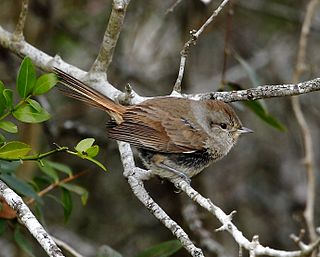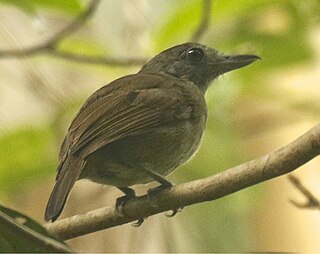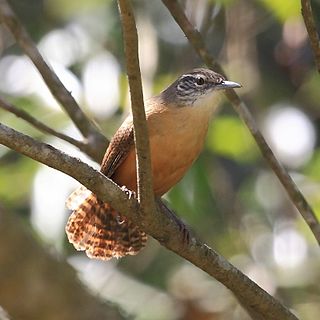
The olivaceous thornbill is a species of hummingbird in the "coquettes", tribe Lesbiini of subfamily Lesbiinae. It is found in Bolivia and Peru.

The sand-colored nighthawk is a species of nightjar in the family Caprimulgidae. It is found in Bolivia, Brazil, Colombia, Ecuador, Peru, and Venezuela.

The rufous-vented ground cuckoo is a Vulnerable species of cuckoo in the tribe Neomorphini of subfamily Crotophaginae. It is found in Bolivia, Brazil, Colombia, Costa Rica, Ecuador, Nicaragua, Panama, and Peru.

The white-faced quail-dove is a species of bird in the family Columbidae. It is found in El Salvador, Guatemala, Honduras, Mexico, and Nicaragua.

The bamboo foliage-gleaner, also known as the crested foliage-gleaner or dusky-cheeked foliage-gleaner, is a species of bird in the Furnariinae subfamily of the ovenbird family Furnariidae. It is found in Bolivia, Brazil, Colombia, Ecuador, and Peru.

The short-billed canastero is a species of bird in the Furnariinae subfamily of the ovenbird family Furnariidae. It is found in Argentina, Bolivia, Brazil, Paraguay, and Uruguay.

The sharp-billed canastero or lesser canastero is a species of bird in the Furnariinae subfamily of the ovenbird family Furnariidae. It is found in Argentina, Bolivia, Chile, Paraguay, and Uruguay, and has also occurred as a vagrant in Brazil.

The Bolivian spinetail is a Vulnerable species of bird in the Furnariinae subfamily of the ovenbird family Furnariidae. It is endemic to Bolivia.

The southern nightingale-wren, also known as the scaly-breasted wren, is a species of bird in the family Troglodytidae. It is found in Bolivia, Brazil, Colombia, Costa Rica, Ecuador, Panama, Peru, and Venezuela.

The grey-mantled wren is a species of bird in the family Troglodytidae. It is found in Bolivia, Colombia, Ecuador, and Peru.

The rufous-fronted thornbird, or common thornbird, is a species of bird in the family Furnariidae. It is found in Brazil, Bolivia, Argentina, Ecuador, Paraguay, and Peru.

The grey-crested cacholote is a species of bird in the Furnariinae subfamily of the ovenbird family Furnariidae. It is found in Bolivia, Brazil, and Paraguay.

The dark-breasted spinetail is a species of bird in the Furnariinae subfamily of the ovenbird family Furnariidae. It is found in Bolivia, Brazil, Colombia, Ecuador, and Peru.

Spix's spinetail, previously known as the chicli spinetail, is a species of bird in the Furnariinae subfamily of the ovenbird family Furnariidae. It is found in Argentina, Brazil, Paraguay, and Uruguay.

The mouse-colored antshrike is a species of bird in subfamily Thamnophilinae of family Thamnophilidae, the "typical antbirds". It is found in Bolivia, Brazil, Colombia, Ecuador, French Guiana, Guyana, Peru, Suriname, and Venezuela.

The orange-headed tanager is a species of bird in the family Thraupidae. Native to South America, it is found in Argentina, Bolivia, Brazil, Colombia, Ecuador, Paraguay, Peru, and Venezuela, where it inhabits successional vegetation, cerrado, riparian forest, shrub, brush, and open woodland. Males of the species have sandy-gray upperparts, cinnamon to buff underparts, white on the center of the lower breast, belly, and tail, and rufous-orange and yellow heads. Females are similar but duller.

The buff-breasted wren is a species of bird in the family Troglodytidae. It is found in the Amazon Basin of northern Brazil and Amazonian Colombia, Ecuador, Peru and northern-border Bolivia, and also the Guianan countries of Guyana, Suriname, and French Guiana. It occurs in non-Amazonian regions of Venezuela and Colombia and its range extends into eastern Panama.

The Sinaloa wren is a species of bird in the family Troglodytidae. It is endemic to Mexico, with almost annual sightings in the United States, in Arizona.

The plain-breasted piculet is a species of bird in subfamily Picumninae of the woodpecker family Picidae. It is found in the Brazil, Colombia, and Peru.

The isthmian wren is a species of bird in the family Troglodytidae. It is found in Costa Rica and Panama.






















